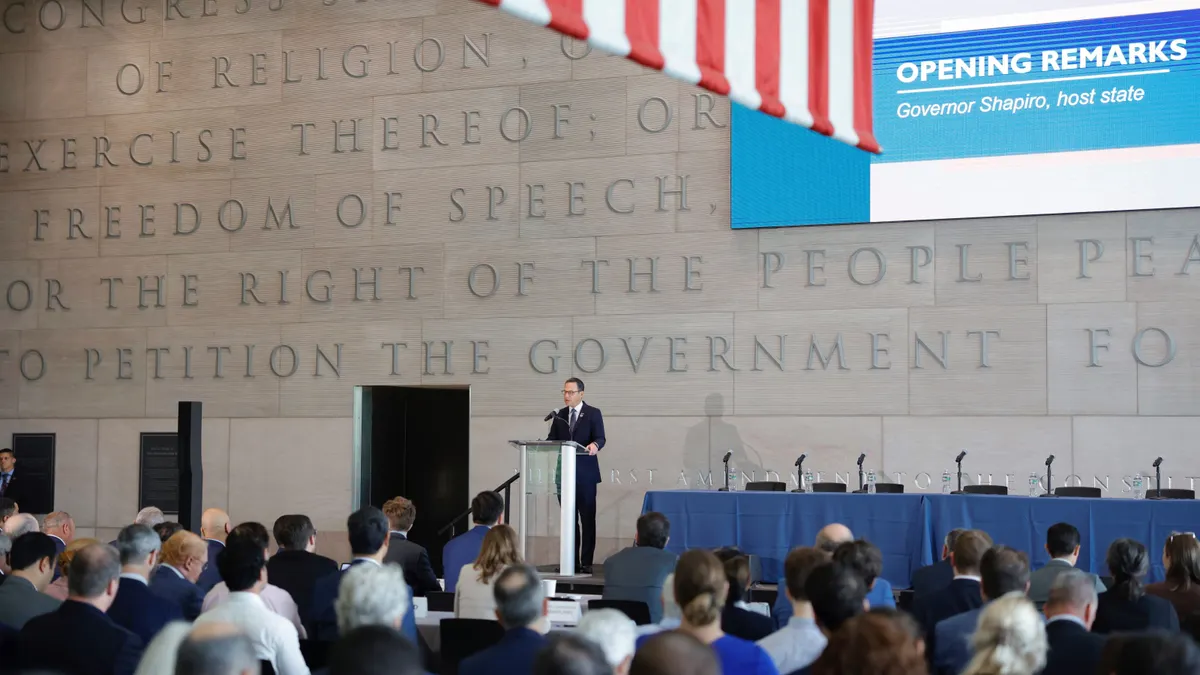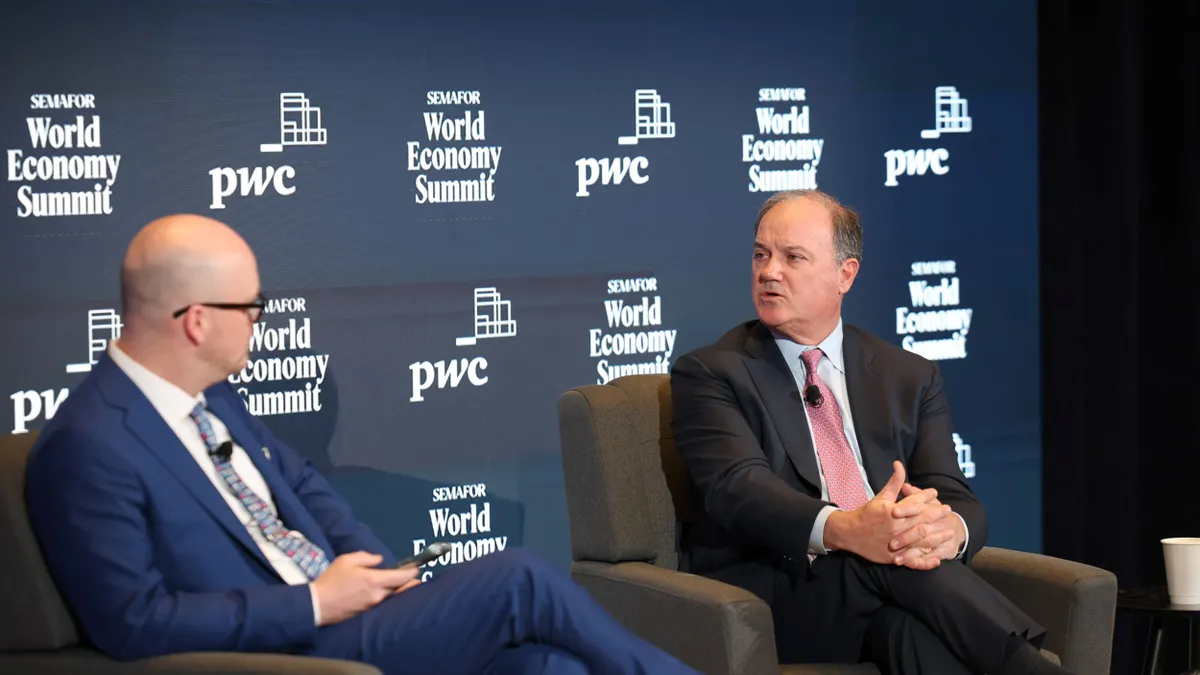Republican and Democratic governors of PJM Interconnection states on Monday threatened to pull out of the grid operator’s markets unless states are given a role in governing the organization.
“If PJM refuses to change, we will be forced to go in a different direction,” Pennsylvania Gov. Josh Shapiro, a Democrat, said at a day-long, state-led conference in Philadelphia. “That is not a path that I am eager to chart, but I am not willing to stand idly by and let PJM dictate our future.”
Virginia Gov. Glenn Youngkin, a Republican, also said his state was prepared to leave PJM, which runs the grid and wholesale power markets where 67 million people live across 13 Mid-Atlantic and Midwest states and the District of Columbia.
“This is a crisis of not having enough power, and it is a crisis in confidence,” Youngkin said. “It's this crisis that demands real reform, real reform immediately — and at the top of the list is that states must have a real say.”
Maryland Gov. Wes Moore, a Democrat, and New Jersey Gov. Phil Murphy, a Democrat, also called for giving states a larger role at PJM.
Unlike in grid organizations such as the Southwest Power Pool and the Midcontinent Independent System Operator, states in PJM lack a formal role in PJM governance.
Governors have sharpened their focus on PJM since capacity prices spiked in a July 2024 auction and again this year, leading to double digit electric bill increases in some states. The jump in capacity prices is partly driven by PJM’s forecast for data center additions in parts of its footprint.
In a Sept.10 letter to PJM’s board, a bipartisan group of governors called for increased state representation at PJM, an increased focus on consumer interests and reforms to the grid operator’s stakeholder processes.
Eleven PJM states plan to form a “governors’ collaborative” to work on PJM issues, Jacob Finkel, a Shapiro aide, said at the meeting. They include Delaware, Illinois, Indiana, Maryland, Michigan, Ohio, Pennsylvania, New Jersey, North Carolina, Tennessee and Virginia.
Reforms that would give states a larger role at PJM need to occur in “months, not years,” Shapiro said in a press briefing.
PJM open to discussions, independent producers oppose states’ request
PJM is open to discussing potential reforms, but that “could take some time,” Manu Asthana, PJM president and CEO, said at the meeting.
Any changes would need to be approved by PJM’s Members Committee, which represents the grid operator’s members, or be done through a complaint filed with the Federal Energy Regulatory Commission, according to Asthana.
In a statement, PJM said its governance structure with a nine-member board has allowed the grid operator to deliver up to $4 billion in annual savings for the region it serves. Also, meeting the demands of the fast-changing energy landscape “will require PJM, the industry and especially our states all working in concert,” the grid operator said.
The governors’ demands met with pushback from the Electric Power Supply Association, a trade group for independent power producers that opposes giving states a governance role at PJM.
“The recent actions to cap the capacity auction results was the opening salvo of a campaign to exert control over the non-partisan regional grid operator by elected officials pursuing short-term political wins ahead of the midterm election,” EPSA President and CEO Todd Snitchler said Monday in a press release.
Giving states a bigger role at PJM will lead to “red tape, gridlock, and a stifling of critically needed investment,” Snitchler said. Instead, states should streamline their permitting requirements for natural gas infrastructure and scale back policies that cause power plants to retire, he said.
FERC filing rights
Participants at the conference called for at least two major reforms: giving states the right to file PJM-related proposals at the Federal Energy Regulatory Commission, and a role in selecting board members.
Having Federal Power Act section 205 “filing rights” — even if they are rarely used — gives states influence in a grid operator’s policy discussions, according to Heather Hunt, executive director of the New England States Committee on Electricity, a group representing the region’s governors.
NESCOE is able to present proposals to FERC through “jump ball” filings that are offered alongside proposals from ISO New England.
“NESCOE is able to use that jump ball, and does so, actually, very rarely,” Hunt said. “The fact that it exists, though, is very powerful … It's a little bit of an enticement for ISO to listen hard to states.”
Citing his experience with MISO, Dan Scripps, Michigan Public Service Commission chair, echoed Hunt’s comments.
“The biggest impact on that is not the fact that we file, because we very rarely do — it's how states then show up in the cost allocation conversation, and increasingly, the [transmission] planning conversation,” Scripps said. “Because that [filing right is] there in the background, the conversation is just fundamentally different.”
Scripps called for making states partners with PJM.
“If you're locked out, you end up … throwing rocks from the outside, whereas if you're brought in and you're centrally involved … it's a different conversation,” Scripps said.
States need to be “key partners” with PJM, according to Abe Silverman, an assistant research scholar at Johns Hopkins University and former general counsel and executive policy counsel for the New Jersey Board of Public Utilities.
PJM should give states a role in selecting the grid operator’s board members, with a preference for people who live in PJM, and with at least one seat dedicated to a former or current state regulator within the PJM footprint, Silverman said. States should also have the right to file proposals at FERC, he added.
“Bringing that political perspective into the process is incredibly valuable,” Silverman said. “The idea that PJM states should just sit there and take it is just not right.”
States should ask PJM to consult with the Organization of PJM States Inc., which represents state utility commissions, before the grid operator makes resource adequacy-related proposals at FERC, according to Kent Chandler, a senior fellow at the R Street Institute, a public policy think thank based in Washington, D.C., and former member of the Kentucky Public Service Commission.
If OPSI doesn’t like PJM’s proposal, the group could file an alternate proposal to be filed alongside the PJM plan, he said.
“It would provide … real ownership from the states,” Chandler said. “It would keep them from sniping from the sideline, and it would say, ‘Put your money where your mouth is. If you have issues with our proposal, come up with your own.’”






















